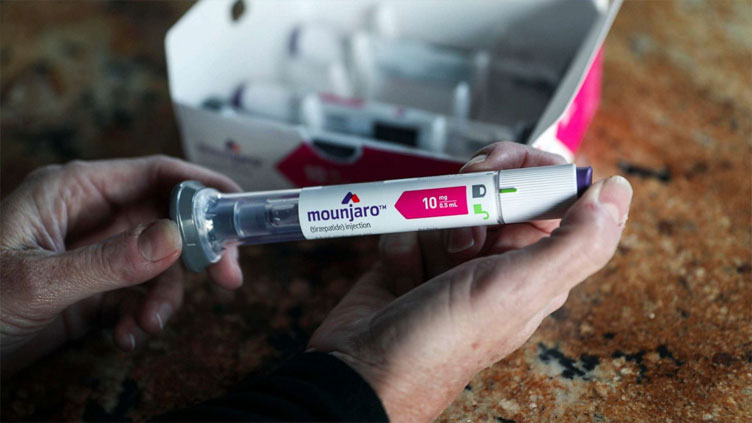Diabetes drug Mounjaro may help people lose 15% of body weight

People lose up to 34 lbs or about 16% of their body weight
ISLAMABAD (Web Desk) - A new report from the pharmaceutical company Eli Lilly has bolstered earlier data that the diabetes drug Mounjaro may be an effective weightloss treatment.
The drug tirzepatide sold under the brand name Mounjaro was approved in 2022 as a glucose-lowering treatment for type 2 diabetes. Now, the drug is showing promise as a weight loss treatment.
In the latest trial dubbed the SURMOUNT-2 trial, Eli Lilly reported that people taking either 10 or 15 mg tirzepatide acheived significant weight loss compared to people taking a placebo. The trial involved people with type 2 diabetes who had obesity and overweight.
They reported that people lose up to 34 lbs or about 16% of their body weight. Eli Lilly has already asked the FDA to give fast track designation for Mounjaro as a treatment for obesity.
“Obesity is a difficult-to-manage disease, and it’s even more difficult for people living with type 2 diabetes,” Dr. Jeff Emmick, MD, PhD, senior vice president of product development at Eli Lilly said in a statement. “The degree of mean weight reduction seen in SURMOUNT-2 has not been previously achieved in phase 3 trials for obesity or overweight and type 2 diabetes.”
The need for weight loss treatments
According to the Centers for Disease Control and PreventionTrusted Source (CDC), the obesity prevalence rate in the United States from 2017 to March 2020 was nearly 42%. The estimated annual medical cost of obesityTrusted Source in the U.S. in 2019 dollars was nearly $173 billion. The CDC says medical costs for adults with obesity were $1,861 higher than medical costs for people of healthy weight.
Mounjaro isn’t the first diabetes drug to show promise for treating obesity. Semaglutide, used in the drugs Ozempic and Wegovy, produced a nearly 16% reductionTrusted Source in body mass index in adolescents and adults with obesity in a clinical trial.
What doctors think of weight-loss drugs
Dr. Michael Glickman is a family and obesity medicine specialist who founded Revolution Medicine Health and Fitness in Washington, D.C. He prescribes Mounjaro and Ozempic and called Mounjaro a “blockbuster drug” and “the most effective weight loss treatment available on the planet, aside from bariatric surgery.”
“We are in a very exciting time right now in the obesity medicine field,” Glickman told Healthline in an earlier interview. “The obesity epidemic began in the 1970s and for the first time in 50 years we now have several extremely effective treatment options to offer patients.”
Glickman said he’s seeing the results of the medications every day in people whose obesity is “reversing. It is vital for the FDA to give Mounjaro a second approval for obesity as soon as possible, as it will open the doors to treatment that millions of Americans have never had access to,” Glickman said.
Dr. Heather Martin, the medical director of the primary care program at virtual health platform K Health, told Healthline her platform is imposing strict criteria in prescribing Mounjaro and Ozempic due to its rising popularity.
There are concerns there’s not enough of the medication to go around. “We have strict criteria to be eligible for prescribing Ozempic and other medications to manage your weight,” Martin said. “Patients must have a BMI (body mass index) over 30, or a BMI over 27 with one associated condition like hypertension or type 2 diabetes and have been unable to lose and keep off weight with lifestyle changes alone.”
Weight loss and type 2 diabetes
Martin emphasized that one of the keys to treating type 2 diabetes is getting someone’s weight down. “Being overweight is also associated with type 2 diabetes, hypertension, kidney disease, and more dire conditions,” Martin said. “Safely and sustainably managing your weight is an essential part of keeping you healthy for the long haul, making these medications important for those who meet the criteria.”
Martin said taking weight-loss medication can be part of a long-term strategy. “Obesity is a chronic condition and is associated with many other chronic conditions that could be incredibly detrimental to your health,” Martin said. “We are lucky that medication now exists to help treat it, adding to the importance of accessibility for the patients who need it.”
The demand for weight loss drugs is an issue
Dr. Jonathan Fialkow, chief of cardiology at Baptist Health Miami Cardiac and Vascular Institute, said the benefits of Ozempic for weight loss are already making it harder to get these drugs for the main reason they were developed.
“Ozempic is not a weight loss medication and was made to treat diabetes,” Fialkow told Healthline in an earlier interview. “The high demand created for Ozempic for weight loss is limiting the supplies needed for people with diabetes. The pharmacies are out of it and we’re jumping through hoops to have them be able to continue on the medication.”
Fialkow said there are side effects to these drugs, including nausea and other gastrointestinal complaints. “For people who may take it without proper management by a physician, they may lose significant weight and this may lower blood pressure,” Fialkow said. “They can then pass out and have other complications associated with that like hip fractures, skull fractures, and such. These medications need to be monitored by your doctor.”
Fialkow said there may be additional risks to prescribing these medications to people without diabetes and more study is needed. “We want people to avoid the risk of losing weight and gaining an unnecessary harmful side effect,” Fialkow said. “Having said that, a major driver of weight gain/obesity, as well as a limitation of most diets, is hunger. People can be extremely overweight and crave food and feel hungry. This medication, through its mechanisms of action, creates a sense of satiety at lower levels of food intake.”

